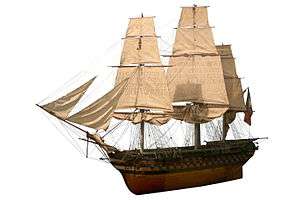French ship Fleurus (1853)
For other ships with the same name, see French ship Dauphin Royal.
 1/40th-scale model of the 100-gun Hercule, lead ship of Fleurus ' class, on display at the Musée national de la Marine. | |
| History | |
|---|---|
| Name: | Fleurus[1] |
| Namesake: | Battle of Ligny, also known as Battle of Fleurus |
| Builder: | Toulon [1] |
| Laid down: | April 1825 [1] |
| Launched: | 2 December 1853 [1] |
| In service: | 1855 [1] |
| Struck: | 17 August 1869 [1] |
| Fate: | Scrapped |
| General characteristics | |
| Class and type: | Hercule class |
| Displacement: | 4440 tonnes |
| Length: | 62.50 |
| Beam: | 16.20 |
| Draught: | 8.23 |
| Sail plan: | 3150 m² of sails |
| Complement: | 955 men |
| Armament: |
|
| Armour: | timber |
Fleurus was a late 100-gun Hercule-class ship of the line of the French Navy, transformed into a Sail and Steam ship.
Service history
Ordered in 1825 as Brianée and soon renamed Dauphin Royal, Fleurus was laid down in 1825 but not completed before 1855. She took her definitive name after the July Revolution, on 9 August 1830. [1]
From January 1855, she conducted her engine trials. She proceeded to the Black Sea to take part in the Crimean War. In 1862, she served as a troopship for the French intervention in Mexico. [1]
She finished her career as a hulk in Saigon, headquarters to the French naval division of Indochina. [1]
Notes, citations, and references
Notes
Citations
References
- Roche, Jean-Michel (2005). Dictionnaire des bâtiments de la flotte de guerre française de Colbert à nos jours 1 1671 - 1870. p. 266. ISBN 978-2-9525917-0-6. OCLC 165892922.
- 100-guns ships of the line
This article is issued from Wikipedia - version of the 4/28/2016. The text is available under the Creative Commons Attribution/Share Alike but additional terms may apply for the media files.